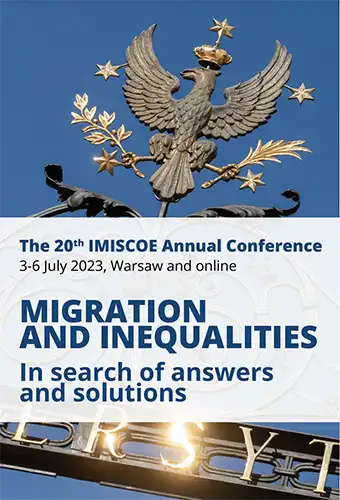ENGAGEMENTS
I-CLAIM at the 2023 IMISCOE Annual Conference in Warsaw
At the 20th IMISCOE Annual conference in Warsaw this year I-CLAIM will host two panels on the production of irregular living and working conditions for migrants and racialized communities in Europe. Both panels investigate the living and working conditions of irregularised migrants in Europe from an intersectional perspective and aim to advance scientific knowledge and theorization on the key underlying dynamics and causal mechanisms that shape the ‘irregular condition’.
The panels will be chaired by Dr. Ilse van Liempt & Prof. Nando Sigona and take as a starting point the observation that dynamic assemblages of interlinked micro, meso and macro factors both shape migrant journeys as well as specific configurations of subjectivities, rights, entitlements, constraints, and challenges in places in which migrants’ lives unfold. Also, what counts as irregular migration and who is considered an irregular migrant varies over time and space and is embedded in specific conditions, histories and structures of power. While irregularity is rooted in legal classifications, its power to limit social mobility and narrowly confine everyday life lies not just in law, but also in the discourses, politics, and practices that accompany the interpretation and implementation of laws, including practices of racialization.
By revealing the spectrum of irregularity in contemporary Europe and casting light on the everyday experiences of migrants with irregular, unstable and/or precarious legal status we hope with this panel to get a clearer understanding of how migrants’ irregular condition’ is produced by the interplay of immigration and asylum laws, policies and practice, wider labour market and welfare regimes, and political, media and public narratives.
Three I-CLAIM consortium members present their work:
Lena Nare
Our Finish I-CLAIM Consortium member, will present on labour market exploitation and migrant irregularity in the Finnish cleaning sector. Drawing on expert interviews and interviews with migrants with irregular legal status working in the cleaning sector in the capital region of Finland, the paper analyses the structural conditions that induce migrant irregularity, precarity and labour market exploitation. The paper also analyses also the impact that platformisation has had in the cleaning sector.
Bastian Vollmer
Our German I-CLAIM Consortium member, will discuss methodological challenges around how to research existing narratives and discourses on irregularisation and the potential impact it has on perceptions among policy actors and local populations, particularly in (re)producing and shifting political attitudes and behaviours. The paper will demonstrate how to employ and triangulate discourse analysis of administrative, political and media narratives (hegemonic and non-hegemonic), and survey experiments to capture public perceptions of irregularity.
Nando Sigona
Our British I-CLAIM Consortium member, will present on the production of EU migrant’s irregularity after Brexit. With the UK leaving the EU came the definition of a new politics of belonging and membership, redefining who is allowed to belong and, importantly, under what terms and conditions in post-Brexit Britain. The paper unravels the mechanisms of production of migrants’ irregularity in post-Brexit Britain and how they impact on the lives of newly arrived and long-established EU citizens in the UK, affecting everyday interactions as well as long-term plans.
Bridget Anderson, Clare Fox-Ruhs, Joakim Palme and Martin Ruhs’ paper discusses how and why the prevailing institutional landscape may matter for the types of irregularity that emerge in migration and migrant labour markets, the conditions and effects of irregular migrants, and host countries politics and attitudes vis-à-vis-irregular migrants. The focus of this paper is on variation in institutional contexts (national labour market regulations, welfare states, migration regimes as well as sectoral policies) and how this shapes the conditions of irregular migrants in Europe and is based on the new Horizon Project PRIME.
Maurizio Ambrosini’s paper centers around the question of deservingness and takes regularization as a policy measure to illustrate selectiveness. Governments in the North have increasingly restricted the possibilities of legally settling in their country, and as such they have “illegalized” a number of immigrants. At the same time, they also provide procedures for the regularization of unauthorized immigrants. This paper examines the avenue of workers’ deservingness by analysing Italian policies in the field, focusing especially on the regularization program enacted in 2020 against the backdrop of the COVID-19 pandemic.
Millena Belloni and Ferruccio Pastore also address regularization in their presentation but focus more on how irregularity and regularity can be better considered as the extremes of a continuum of legal and bureaucratic situations. The trajectories of migrants who hold a regular status in a member state, but work and reside elsewhere in Europe are an important case in point to understand how local, national and European policies play out in migrants’ lives.
Sandra King-Savic and Caitlin Procter present a framework for engaging the potential dilemmas that arise when researching irregular migrants, especially regarding the process of co-creation- and dissemination of knowledge.
